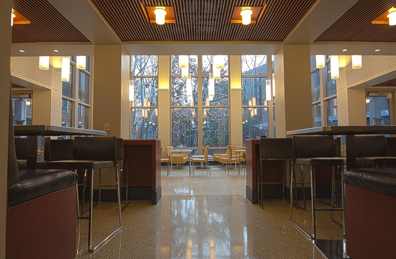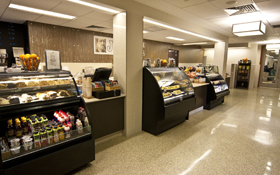Café Renovation Increases Efficiency
PHILADELPHIA — A café at the University of Pennsylvania’s business school recently received LEED Gold certification, a part of the design firm’s overall plan to increase the efficiency of the hall.
Joe’s Cafe, the Wharton School’s LEED Gold for Commercial Interiors project, is located in Steinberg Hall – Dietrich Hall, which houses administration, several academic department offices, Wharton faculty offices, conference rooms, and teaching spaces.

Photo credit: D.A. Webster Photography.
The building was originally designed by McKim, Mead and White in 1952.
Philadelphia-based Voith & Mactavish Architects was retained to prepare a concept design for the building, with the initial focus on creating a unified image for the Wharton campus and incorporating the core aesthetics of the campus’s flagship building, Jon M. Huntsman Hall, according to the firm.
“The sustainable initiatives of the school and desire to create space for collegiality was central when designing this café," said Daniela Holt Voith, principal at Voith & Mactavish Architects. "The building is an exemplary illustration of how green design can be contemporary and sophisticated within an established campus vernacular, while a light and open design provides a seamless flow between the interior and exterior spaces.”
The space previously housed a food-service venue, but was reconfigured to include a large workable kitchen and an adjacent open area for the servery and display.
The kitchen, where all of the large equipment is Energy Star certified, also has recycling and composting programs.
The 1,300-square-foot addition features 18-foot-high ceilings, full-height windows and a green roof, along with doors that open to a seating area overlooking Steinhardt Garden and Woodland Walk.
The café’s steel-trellis, limestone-clad columns extend the garden pavilion and provide shade for both the interior space and outdoor rooms for summer dining. The self-contained seating area is used for meetings, study, and social events when the servery is not in operation.
Keeping in mind the original design, an additional 6,500-square-foot space was reworked for a more efficient reprographics center, a vending area and a new office suite with windows facing the west entrance courtyard. 
Public restrooms were relocated them from within the cafe to the main corridor for accessibility, and a redesign of the service entry and corridor off the existing loading dock was made separate from the public entrance, which is now ADA accessible.
The school also added a three-story tower adjacent to the south stair that provides upper story offices, a multi-purpose room and conference rooms.
With low-flow sinks and low-power lighting, the facility has reduced its potable water use by almost 50 percent from baseline values, and 42 percent in power reduction from the ASHRAE standard baseline.
During construction, the project recycled 63 percent of its construction waste from landfill dumping. Much of the café’s material content was manufactured using recycled content and locally made, officials from the firm said.
The building materials — adhesives, sealants, paints, coatings, and flooring materials — contain low VOC for healthy indoor air quality, and none of the wood products contained formaldehyde.
“The project also strove to best represent Wharton’s three core values: commitment to innovation, broad expertise and global outreach,” officials said. “An important social space which has improved opportunities for collegiality for the school, the café has already become a destination and a draw to the broader Penn population.”
